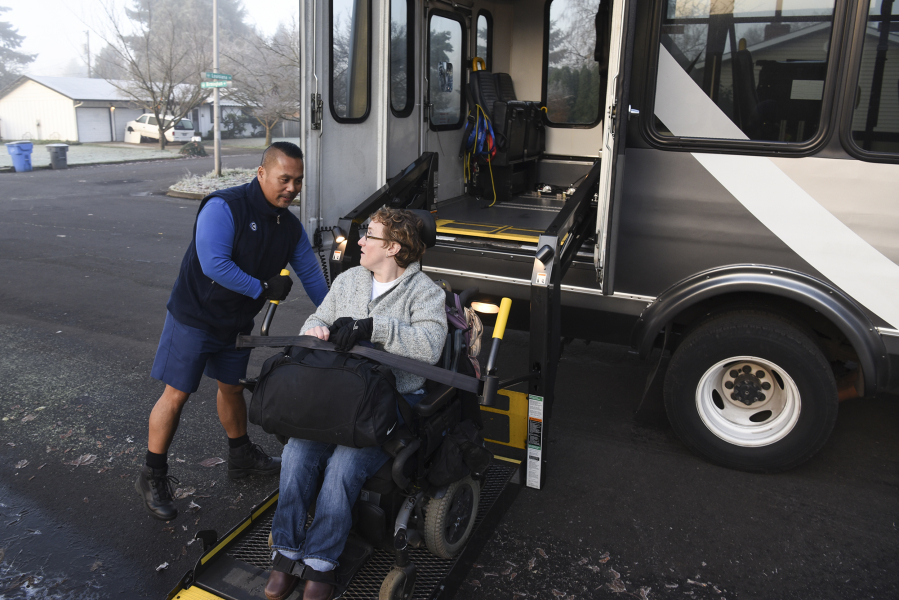C-Tran’s proposal to eliminate its daily and monthly paratransit passes will help to control costs and preserve its services, but some people worry the move would put a heavy burden on some of the service’s most dependent users.
Federal law requires C-Tran to provide transit service for people with disabilities that complements its regular fixed-route bus system. C-Van accounts for 4 percent of the agency’s ridership but about 23 percent of operating costs. C-Van customers typically pay $1.80 per ride, but C-Tran’s actual cost of providing the trip is $44. Meanwhile, a fixed-route bus ride typically costs $1.80, while C-Tran’s expense to provide the ride is about $6.
As the community’s population ages and more people begin to use paratransit, C-Tran wants to be sure the cost of providing the service doesn’t affect the viability of its other services in the long term.
“I think there’s a misconception that agencies are worried about their bottom lines. That’s not true. We’re concerned about our customers. We need to be able to make this sustainable,” C-Tran spokeswoman Christine Selk said.
About 1,270 people use C-Van every month and take about an average of 18,800 trips. But, according to Selk, of those 1,270 riders, only about 450 buy a monthly pass and only around 150 take the 33 trips required to equal its $59 cost. But the riders who do ride enough to make up the cost of a monthly pass ride a lot. Those “heavy users” take an average of 43 C-Van trips per month.
“I think the heaviest users are the heaviest users because they don’t have any other form of transportation. But they might also be the ones that have jobs,” said Alicia Crowley, an employment specialist for people with developmental disabilities.
The agency Crowley works for offers travel training to teach clients how to use the fixed-route bus system.
“(But) even through that program … it’s a very big, long learning curve,” she said.
Many of the people she works with are unable to drive and live too far from fixed routes. Thus, many rely heavily on C-Van to get to and from work. However, their shifts might be only three hours long, and Crowley worries the increased transit costs will eat into their already small paychecks.
Selk acknowledges the move could affect C-Van’s heaviest users, but she said it’ll spare the majority of its riders. And those who buy a monthly pass but don’t ride often enough to recoup its cost will likely save money.
Selk added that the incoming electronic fare system, the Hop Fastpass, also plays a role in the decision to drop the passes. Starting in July, fixed-route riders will begin loading an electronic card with money and scanning it when they step onto a bus. C-Van won’t start using the system until the end of the year, and the current passes won’t be phased out until the Fastpass goes online.
The card can be automatically reloaded. The system also logs where and when it is used. The information is available as a downloadable spreadsheet.
Terry McCann’s disabled daughter uses C-Van twice a day, five days a week. He said she’s tried to learn how to ride fixed-route buses in the past, but it didn’t work well. Even if she were to try fixed routes again, she now lives in an area where she’d have to walk on hilly roads without sidewalks to get to a bus stop.
“I wouldn’t feel comfortable (with that),” McCann said in an interview. “She’s too vulnerable.”
He buys her a year’s worth of monthly passes at a time. He said C-Tran gives them one month free and mails a new one when the old one expires. He said he wouldn’t object to paying for all 12 months if it meant keeping the current system in place.
But McCann doesn’t like the idea of the agency possibly being able to track how and when she rides through the incoming electronic fare system.
“It’s not like they don’t have all that data — who took what bus from where to where — it’s just one more piece of no privacy. That seems to be technology’s goal. I don’t like it,” he said.
C-Tran’s Board of Directors is expected to take up the issue during its regular meeting at 5:30 p.m. May 9 at the Vancouver Community Library, Columbia Room, 901 C St.




